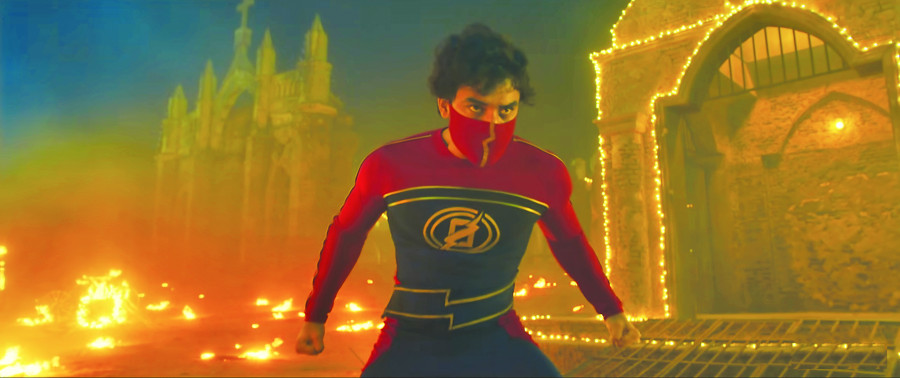Entertainment
The simple brilliance of ‘Minnal Murali’
Rarely does a superhero film give importance to the character-building of a villain as of the hero and makes us feel for the villain as much as we do for the hero.
Shranup Tandukar
(Editor’s note: The review contains spoilers of the film)
Superhero films are among the highest-grossing film genres, and Hollywood superhero franchises like Marvel and DC dominate the genre. The formulaic structure of superhero films is predictable, yet there is pleasure in the predictability. Most of us relate to the ‘good guys’, and we cheer for the ‘good guys’ to defeat the evil in a final showdown of epic proportions. One can peacefully enjoy a superhero film in the knowledge that eventually the good will prevail over the bad, by any means necessary.
But like many others, my experience with superhero (or supervillain) films revolved only around Hollywood, from ‘Avengers: Infinity War’ to ‘Joker’ to ‘Spiderman: No Way Home’. So when I was recommended to watch a Malayalam superhero film, I didn’t know what to expect. My only experience with Malayalam films was ‘Kurup’, and though I had enjoyed it, it hadn’t instilled a craze for Malayalam films in me. I was sceptical if the Malayalam superhero film ‘Minnali Murali’ could rival the likes of Hollywood or Bollywood superhero films. It didn’t take long for me watching ‘Minnal Murali’ to find out that not only could it rival foreign superhero films but be even better.
Directed by Basil Joseph and written by Arun Anirudhan and Justin Mathew, ‘Minnal Murali’, one of the few Malayalam superhero films, was released on Netflix on December 24, 2021. ‘The Gambler’ and ‘Parakkum Pappan’ are the other two Malayalam superhero films that were released last year. The brilliance of ‘Minnal Murali’ lies in the fact that it does justice to both characters that matter in a superhero film—the superhero and the supervillain. Rarely does a superhero film give importance to the character-building of a villain as of the hero and makes us feel for the villain as much as we feel for the hero.
The film opens with a scene from the past. A theatre play, ‘The Saint of Pallikunu’, is shown at a carnival in front of a crowd. A boy watches the show with rapt attention as the hero in the play descends from above the curtain to fight a group of villains. However, the gleeful atmosphere soon turns into absolute anarchy as a fire ignites near the firecracker storage, and explosions burst everywhere. The boy is injured by a stray rocket and catches a glimpse of the play's hero in the wreckage of the play stage. The whole scene acts as a foreshadow containing clues to a future big twist and even to the final showdown.
The film's sound design is superb, and we can sense the expertise of the sound department headed by Nixon George right from the get-go. The non-diegetic sounds perfectly complement the events in the story—playful, childlike tune plays when characters are happy, suspenseful music when characters are sad, and upbeat music during montages throughout the film.
At present in Kurukkanmoola village, a youthful, brawny tailor Jaison (played by Tovino Thomas) is hopeful. He is happily in love with his beloved Bincy and is applying for a visa to the US in the hopes that he can make it big in America and successfully convince the parents of Bincy for her hand. On the other hand, a village outcast named Shibu (played by Guru Somasundaram) spends his days in the dingy kitchen of a village cafe. His appearance is unkempt- his hair ruffled and wild, his beard unknown of the invention of razor blades, and his clothes stained. While Jaison is full of hope, Shibu is full of worry as he has lost his wallet, devoid of money but with a precious picture.
The two central characters—Jaison (the hero) and Shibu (the villain)—are introduced in tandem. Their stories run parallel and intertwine at times before the final climax, the final showdown between the good and the bad.
Festivals, celebrations, and fairs are pivotal events in the film; the main events in the movie happen during events of much rejoicing and action. During the celebration of Christmas, the weather worsens and lightning crackles throughout the sky. There is discord in the heart of Jaison, too, as he finds out that Bincy is engaged to Aneesh (played by Jude Anthony Joseph). At the same time, Shibu finally finds his lost wallet with a childhood photo of Usha (played by Shelly Kishore) and finds out that Usha is back in town. While Jaison is heartbroken, Shibu’s heart fills with love rekindled. When lightning strikes both Jaison and Shibu simultaneously, sending “thousands of megawatts of electricity” through their bodies, they both gain superpowers.
While Jaison’s superpowers are mainly super strength, sonic speed, and enhanced hearing, Shibu’s superpowers are primarily telekinesis, sonic speed, and superstrength.
There is an element of comparison between Jaison and Shibu throughout the film. Their actions and motivations conform and contrast, edging them closer to their fates to face off against each other in the end.
When Jaison realises the extent of his newfound superpowers, he takes revenge on the head sub-inspector Sajan Antony for assaulting and disrespecting his father Varkey. Shibu does something similar—telekinetically threatening his boss for sexually harassing Usha. However, as the story progresses, the contrast between them also starts to widen into a chasm. The nephew of Jaison, Josemon, introduces Jaison to Hollywood superheroes— Superman, Batman, and Spiderman—who use their power for good, and Jaison starts to emulate them. On the other hand, Shibu desperately wants to reconcile with Usha and confess his 28-year-old unrequited love. But there are obstacles in his way, namely Usha’s brother Daasan and another romantic competitor vying for Usha’s love.
However, Shibu isn’t a mindless murderer who goes on a rampage throughout cities in a quest to subdue humans and rule the world. He is a human who simply wants love and uses his newfound superpower to clear obstacles in the way. However, power is a dangerous thing, and absolute power corrupts absolutely. Shibu doesn’t take long to turn corrupt as people around him continue to look down upon him, but now, he has the power to fight back. When Daasaan rebuffs his proposal to marry Usha and instead insults his mother, Shibu’s absolute corruption is complete. He murders Daasaan and burns Jaison’s clothing store along with Daasaan inside to the ground. The acting prowess of Guru Somasundaram shines when Shibu murders Daasan in cold blood, and his whole demeanour changes into a ruthless killer willing to go to any lengths. Even when Shibu wants to destroy the village, he doesn’t want to become a ruler. He simply wants to destroy everything and everyone in the village.
While Shibu gets more corrupt by the day, Jaison finds out his true ancestry and names himself ‘Minnal Murali’ as a part of his destiny to pursue the path of a superhero who protects his village from harm. When Shibu spreads chaos in the village in the name of ‘Minnal Murali’ too, Jaison teams up with Josemon and ‘Bruce Lee’ Biji, the ex-girlfriend of Aneesh, to uncover the identity of the imposter.
Minnal Murali isn’t a revolutionary film, and the plot is a more or less predictable one. As a comparatively low-budget superhero film, there are more practical effects rather than VFX in the film. However, it still stands out from the pack of superhero films chiefly because it does a simple thing brilliantly—the superhero isn’t the only one whose origin story is explored and, in the end, fights a masked villain bent on destroying the world. The villain Shibu gets considerable screen time. We see his transformation from a man forsaken by his village into a vengeful character capable of doing anything to gain his beloved. His story arc resembles the African proverb- “A child who is not embraced by the village will burn it down to feel its warmth.” And as viewers, we understand the reason behind the anger and madness.




 6.12°C Kathmandu
6.12°C Kathmandu










